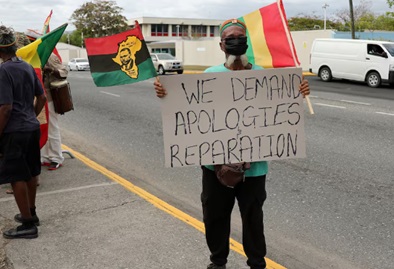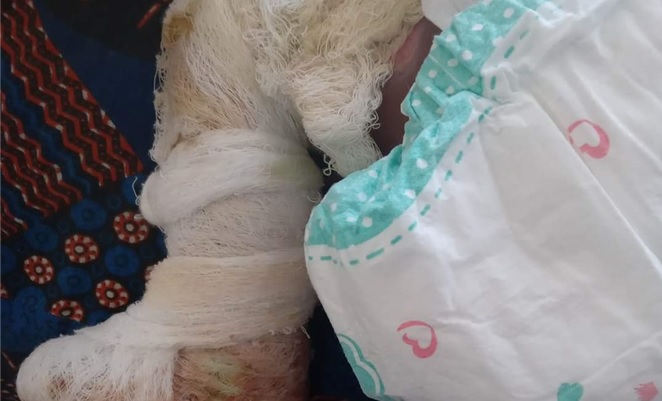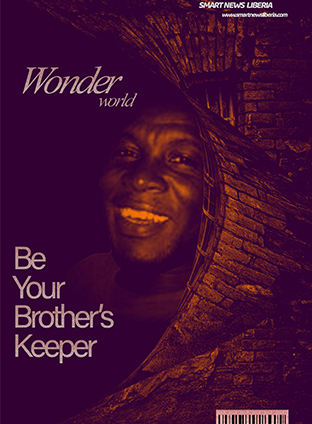(REUTERS) – Support is building among Africa and Caribbean nations for the creation of an international tribunal on atrocities dating to the transatlantic trade of enslaved people, with the United States backing a U.N. panel at the heart of the effort.
A tribunal, modelled on other ad-hoc courts such as the Nuremberg trials of Nazi war criminals after World War Two, was proposed last year. It has now gained traction within a broader slavery reparations movement, Reuters reporting based on interviews with a dozen people reveals.
Formally recommended in June by the U.N. Permanent Forum on People of African Descent, the idea of a special tribunal has been explored further at African and Caribbean regional bodies, said Eric Phillips, a vice-chair of the slavery reparations commission for the Caribbean Community, CARICOM, which groups 15 member states.
The scope of any tribunal has not been determined but the U.N. Forum recommended in a preliminary report that it should address reparations for enslavement, apartheid, genocide, and colonialism.
Advocates, including within CARICOM and the African Union (AU), which groups 55 nations across the continent, are working to build wider backing for the idea among U.N. members, Phillips said.
A special U.N. tribunal would help establish legal norms for complex international and historical reparations claims, its supporters say. Opponents of reparations argue, among other things, that contemporary states and institutions should not be held responsible for historical slavery.
Even its supporters recognise that establishing an international tribunal for slavery will not be easy.
There are “huge obstacles,” said Martin Okumu-Masiga, Secretary-General of the Africa Judges and Jurists Forum (AJJF), which is providing reparations-related advice to the AU.
Hurdles include obtaining the cooperation of nations that were involved in the trade of enslaved people and the legal complexities of finding responsible parties and determining remedies.
“These things happened many years ago and historical records and evidence can be challenging to access and even verify,” Okumo-Masiga said.
Unlike the Nuremberg trials, nobody directly involved in transatlantic slavery is alive.
Asked about the idea of a tribunal, a spokesperson for the British Foreign Office acknowledged the country’s role in transatlantic slavery, but said it had no plan to pay reparations. Instead, past wrongs should be tackled by learning lessons from history and tackling “today’s challenges,” the spokesperson said.
However, advocates, opens new tab for reparations say Western countries and institutions that continue to benefit from the wealth slavery generated should be held accountable, particularly given ongoing legacies of racial discrimination.
A tribunal would help establish an “official record of history,” said Brian Kagoro, a Zimbabwean lawyer who has been advocating for reparations for over two decades.
Racism, impoverishment and economic underdevelopment are linked to the longstanding consequences of transatlantic slavery from the United States to Europe and the African continent, according to U.N. studies, opens new tab.
“These legacies are alive and well,” said Clive Lewis, a British Labour MP and a descendant of people enslaved in the Caribbean nation of Grenada.
Black people “live in poorer and more polluted areas, they have worse diets, they have worse educational outcomes… because structural racism is embedded deep.”
NIGERIA IN FAVOUR
The proposal for a tribunal was discussed in November at a reparations summit in Ghana attended by African and Caribbean leaders.
The Ghana summit ended with a commitment, opens new tab to explore judicial routes, including “litigation options.”
Africa’s most populous nation, Nigeria, is in favour of the push for a tribunal, Foreign Minister Yusuf Tuggar told Reuters in February, saying the country would support the idea “until it becomes a reality.”
In Grenada, where hundreds of thousands were enslaved, Prime Minister Dickon Mitchell is “in full support,” a spokesperson said, describing the tribunal as a CARICOM-led initiative.
Phillips said the work to establish a tribunal would have to take place through the United Nations system and include conversations with countries, including Portugal, Britain, France, Spain, Netherlands and Denmark, that were involved in trading enslaved people to the Caribbean and other regions.
Reuters could not establish how many countries in Africa and the Caribbean were likely to support the idea.
Among the tribunal’s most vocal advocates is Justin Hansford, a Howard University law professor backed by the U.S. State Department to serve at the U.N. forum. He said the idea will be discussed at the forum’s third session, starting April 16, due to be attended by 50 or more nations.
Hansford then plans to travel to Africa to lobby for further support, with the goal of raising the proposal with stronger backing during the U.N. General Assembly in September, he told Reuters.
“A lot of my work now is to try to help make it a reality,” he said of the tribunal, saying it could take three to five years to get it off the ground. Phillips said the goal was to garner enough support by 2025.
The United States, which has financed the U.N forum, “will make a decision on the tribunal when it has been developed and established,” a U.S. State Department spokesperson said. “However, the United States strongly supports” the forum’s work, the spokesperson added.
Regarding reparations, “the complexity of the issue, legal challenges, and differing perspectives among Caribbean nations present significant challenges,” the spokesperson said.
The U.N. leadership has now come out in support for reparations, which have been used in other circumstances to offset large moral and economic debts, such as to Japanese Americans interned by the United States during World War Two and to families of Holocaust survivors.
“We call for reparatory justice frameworks, to help overcome generations of exclusion and discrimination,” U.N. General Secretary Antonio Guterres said on March 25, in his most direct public comments yet on the issue. Guterres’ office did not respond to a request for comment about a possible tribunal.
“No country with a legacy of enslavement, the trade in enslaved Africans, or colonialism has fully reckoned with the past, or comprehensively accounted for the impacts on the lives of people of African descent today,” said Liz Throssell, spokesperson for the U.N. Human Rights office, in response to a question about the tribunal.
The Netherlands apologised for its role in transatlantic slavery last year and announced a roughly $200 million fund to address that past. A spokesperson for the foreign ministry said it was not aware of the discussions around a tribunal and could not respond to questions.
The French government declined to comment. The governments of Portugal, Spain and Denmark did not respond to requests for comment.
CLAIMANTS AND DEFENDANTS
The push for a tribunal stems in part from a belief that claims need to be enshrined in a legal framework, said Okumu-Masiga, of the Africa Judges and Jurists Forum.
Several institutions, including the European Union, have concluded that transatlantic slavery was a crime against humanity.
After the 1940s Nuremberg trials, the U.N. formalised the structure of special tribunals – criminal courts set up on an ad-hoc basis to investigate serious international crimes, such as crimes against humanity.
The U.N. has since established two: one to prosecute those responsible for the 1994 Rwandan genocide and another to prosecute war crimes committed in the former Yugoslavia in the 1990s.
The Rwanda and Yugoslavia tribunals were established by the U.N. Security Council, however the International Criminal Court, another international U.N. tribunal, was founded through a General Assembly resolution, a possible route for a slavery reparations tribunal, Hansford said.
Okumu-Masiga said affected countries, descendents of enslaved people and indigenous groups could be potential claimants, while defendants could include nations and institutions with historic links to slavery or even descendants of enslavers.
An international tribunal is not the only judicial path available.
At a summit of Caribbean countries in February this year, the gathered prime ministers and presidents proposed working with the AU to request an ICJ advisory legal opinion on reparations through the U.N. General Assembly, a source familiar with the matter at CARICOM said.
Makmid Kamara, founder of the Accra-based civil society group Reforms Initiatives that works with the AU on reparatory justice, said decisions on which route to take would be made based on that advisory by the ICJ.
REPARATIONS MOVEMENT
From the 15th to the late 19th century, at least 12.5 million enslaved Africans were forcibly transported by mainly European but also U.S. and Brazilian-flagged ships and sold into slavery.
Before pushing for the abolition of slavery, Britain transported an estimated 3.2 million people, the most active European country after Portugal, which enslaved nearly 6 million.
Those who survived the brutal voyage ended up toiling on plantations under inhumane conditions in the Americas, mostly in Brazil, the Caribbean and the United States, while others profited from their labour.
Calls for reparations started with enslaved people themselves.
“They ran away, they raised their voices in songs of protests, they fought wars of resistance,” said Verene A. Sheperd, director of the centre for reparation research at the University of West Indies.
The movement later garnered support from quarters as varied as U.S. civil rights leader Martin Luther King Jr. and the Caribbean’s Rastafarians. In the past year, some of the world’s largest institutions have added their voices.
Ghana led efforts to get African support for formally pursuing reparations, with Nigeria, Senegal and South Africa also taking up the cause, said Kamara.
Most discussion has focused on transatlantic trafficking, Hansford and Phillips said, rather than the older trans-Saharan trade to the Islamic world, estimated to have transported several million enslaved Africans.
What reparations would consist of in practice is debated. Some, including in the United States, have pushed for individual payments to descendants of enslaved people. CARICOM, in a 2014 plan, called for debt cancellation and support from European nations to tackle public health and economic crises.
The AU decision to join CARICOM has given new heft to the campaign, said Jasmine Mickens, a U.S.- based strategist for social movements who specialises in reparations.
The AU is now developing Africa’s own white paper on what reparations might look like, said Okumu-Masiga.
“We have a global community behind this message,” said Mickens, who attended the Ghana event. “That’s something this movement has never seen before.”







